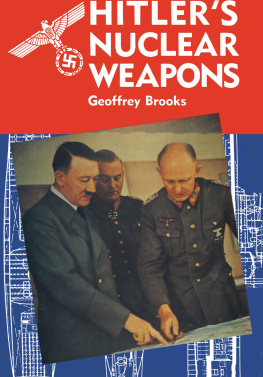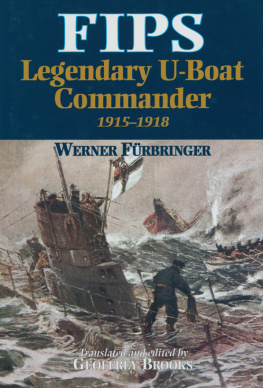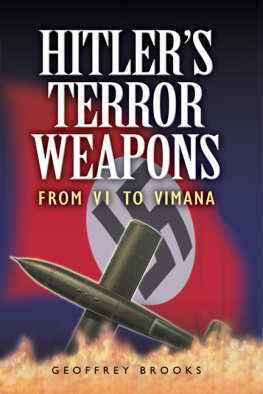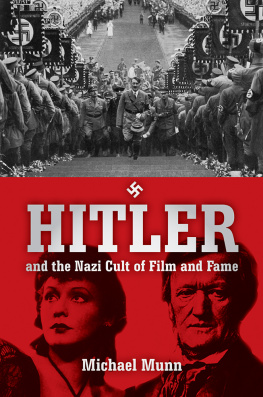HITLERS NUCLEAR WEAPONS
HITLERS NUCLEAR
WEAPONS
The Development and Attempted Deployment
of Radiological Armaments by Nazi Germany
by
Geoffrey Brooks
LEO COOPER
LONDON
First published in Great Britain in 1992 by
LEO COOPER
190 Shaftesbury Avenue, London WC2H 8JL
an imprint of
Pen & Sword Books Ltd,
47 Church Street, Barnsley, South Yorkshire S70 2AS
Copyright Geoffrey Brooks, 1992
ISBN 0 85052 344 3
A CIP catalogue record for this book is available
from the British Library
Typeset by Yorkshire Web, Barnsley, South Yorkshire
in Times Roman 10 point
Printed by
Redwood Press,
Melksham, Wiltshire
CONTENTS
For my sons Louis Leon and Anthony Emil
and in grateful memory of Werner Karl Heisenberg
ACKNOWLEDGEMENTS
The evidence for the existence of Hitlers nuclear weapons came to light in Wolfgang Hirschfelds book Das Letzte Boot (Universitas Verlag, Munich 1989), an account of his captivity in the United States shortly after the Second World War. I am indebted to him for his unvarying kindness and assistance in responding urgently and at great length to all the questions which I put to him.
I must also express my great appreciation to the German Historical Institute, Bloomsbury, London; to the Science Museum Library, South Kensington, London, and to Dr Albert Miller and his staff at the Kernforschungszentrum, Karlsruhe, Germany, without whose freely given help this work could not have been completed.
Geoffrey Brooks
London, 1992
The first serious mention of the possibility that the atomic bomb might not be used came after V-E Day, when Under-Secretary of War Patterson asked me whether the surrender in Europe might not alter our plans for dropping the bomb on Japan. A little later some of the scientists began to express doubts about the desirability of using the bomb against Japan. President Truman knew of these diverse and conflicting opinions. He must have engaged in some real soul-searching before reaching his final decision.
The development of nuclear energy in Nazi Germany never got beyond the laboratory stage.
General Leslie R. Groves, US Army;
Chief of Military Intelligence of
Enemy Activities;
Head of Manhattan Project 194247.
Now It Can Be Told
Harper, New York 1962.
W HAT DID THE AMERICAN atomic physicist, Robert J Oppenheimer, mean when he said that the atom bombs dropped on Hiroshima and Nagasaki in 1945 came from German arsenals?
Following pressure from a CNN television documentary team in 1983, the United States Naval Archive disclosed a loading list which admitted a consignment of 550 kilos of uranium aboard the surrendered German submarine U-234 at Portsmouth, New Hampshire, in May, 1945. However, the authorities declined to discuss the matter further, claiming the protection of their atomic secrecy legislation. Since the Americans were perfectly open about accounting for the uranium seized by their forces in mainland Europe at the wars conclusion, what is the reason for the inordinate secrecy surrounding this particular half-ton?
The question is: is it really true that the atomic energy project in Nazi Germany failed?
Wolfgang Hirschfelds book Das Letzte Boot (Universitas Verlag, Munich 1989) is an account of his captivity in the United States following the surrender of the U-boat on which he served as Senior Radio Operator in the rank of Warrant Officer (Telegraphy). Hirschfeld himself certainly did not understand the significance of what he saw as he watched the submarine being loaded at Kiel and unloaded at Portsmouth, New Hampshire, but as an inveterate diarist, he duly noted the event with precision.
When I read a copy of his book, my knowledge of one particular aspect of nuclear physics, together with my understanding of the circumstances of the voyage of U-234, immediately convinced me that the cargo aboard U-234 was Hitlers nuclear weapons.
Wolfgang Hirschfeld is a most important character in this history, for without his account, Hitlers nuclear weapons would have remained a secret for ever; it was a happy coincidence that such a keen observer should have been aboard U-234 on her maiden war voyage.
The destination of U-234 had been Tokyo; the undertaking was unique in the history of war simply because the destinies of two great warring nations, the United States and the Empire of Japan, hinged upon whether or not the submarine arrived there.
Hirschfeld was born in Berlin on 20 May, 1916, and after a period as a deckhand aboard a Baltic fishing trawler enlisted in the German Navy in December, 1935. Upon completion of basic training at Stralsund, he served with the Wireless Monitoring and Observation Service (B-Dienst) before returning to Fleet duty aboard minesweepers in September, 1937.
By the outbreak of war two years later, he was Petty Officer (Class III) and in charge of the wireless office of the Torpedo boat T-139. T-139 was a relic from the Great War and with the exception of Hirschfeld, the entire crew were reservists.
During the first six months of the European conflict, the boat was stationed in the Kattegat on contraband control duty. On returning to Kiel for a refit at the beginning of April, 1940, Hirschfeld was ordered to report aboard the 6,000 ton light cruiser Karlsruhe waiting to sail at Wilhelmshaven.
On that Sunday afternoon Hirschfeld sent a junior radio operator to Kiel railway station with his seabag, properly labelled, and then he joined his colleagues at a farewell party he had thrown. Leaving it to the last moment before setting off for the train-ferry at Kiel-Garden, he found time always against him, and he swears to this day that the ferry sailed a minute early, causing him to miss it. He waited in great agitation for the next, and on finally arriving at the other bank, sprinted up the steps to the railway platform from where, bathed in sweat, he watched the red tail-lamps of the last train to Wilhelmshaven slowly dwindling in the distance. He gave chase along the sleepers of the track until rugby-tackled by two military policemen.
He did not know it then, but it was the decisive moment for his future life.
With the permission of the commander, he returned to T-139 in order to await the morning express, but that evening the German fleet sailed for Norway as Operation Weserbung unfolded, and Hirschfeld remained on T-139 in his old position for the duration of the emergency. T-139 embarked troops at Warnemnde for the invasion and landed them in southern Norway, afterwards returning safely to Kiel.
Meanwhile the cruiser Karlsruhe had been torpedoed and sunk off Christians and by the British submarine HMS Truant. All her surviving telegraphists were remustered en masse to the wireless office of the battleship Bismarck. Hirschfelds name had been erroneously included on the crew list of the Karlsruhe and Lieutenant-Commander Schwarten of T-139 had omitted to inform the Admiralty that Hirschfeld was remaining at his old posting. It was, therefore, presumed that Hirschfeld had been drowned on the Karlsruhe.
It was some time before the error was discovered, and when it was, Hirschfeld was placed at the disposal of the U-Boat Arm. He now became the NCO in charge of the wireless office of the Type IXb submarine U-109 which commissioned at Bremen in December, 1940, and sailed for the Atlantic from Cuxhaven on 7 May, 1941.










